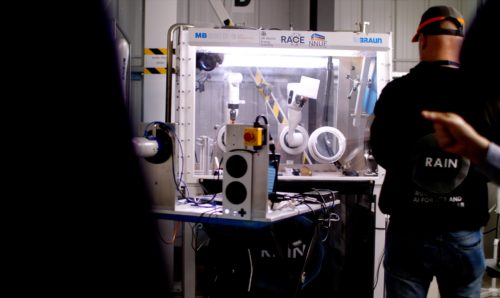New fellowship unites AI and anthropology
Projects 21st January 2019
The Robotics and AI for Nuclear (RAIN) Hub and The Beam have announced a new post-doctoral research position applying ethnographic research to robotics and artificial intelligence in the nuclear industry.
 The RAIN Hub is a £12 million project funded by the Industrial Strategy Challenge Fund, part of the government’s modern Industrial Strategy.
The RAIN Hub is a £12 million project funded by the Industrial Strategy Challenge Fund, part of the government’s modern Industrial Strategy.
It is a collaboration of seven partner universities (Manchester, Lancaster, Oxford, Liverpool, Sheffield, Nottingham and Bristol) and RACE, aiming to increase robotic and AI deployments in the nuclear industry, transforming future working processes in this challenging environment.
Through a collaboration with The Beam, applicants are now being sought to fill a research associate position to conduct ethnographic research on the social and organisational aspects of using advanced robotics and AI in the nuclear industry (closing date: 18/02/2019).

Barry Lennox, Professor of Applied Control at The University of Manchester and Institution lead for RAIN, said: “Improving productivity and reducing risk across the nuclear industry, through the use of robotic systems, are important aims of the RAIN Hub.
“However, convincing industry to deploy the latest robotics technologies can be challenging in an industry that is so highly regulated and conservative.
“By working with The Beam we are hoping to gain crucial insight into the possibilities and limitations of robotics deployment in the nuclear sector.”
The adoption of novel technologies, such as robots and AI, into a complex environment raises interesting sociological questions.
While there are clear benefits of removing humans from harsh working environments, robotic systems have had little impact on the nuclear industry.
This research fellowship has been created to explore the possibilities and limitations for the development and adoption of such technologies, as well as the social, ethical and political questions raised by the technologies developed in the RAIN Hub.
These questions might include issues of trust and transparency; the ways in which advanced robotics technologies could reduce or increase the experience of safety in the workplace; the possibilities for automated technologies to reconfigure working environments; the legal and socio-economic dimensions of human partnerships with intelligent machines; and/or the role of uncertainty in the design and operation of intelligent systems.




